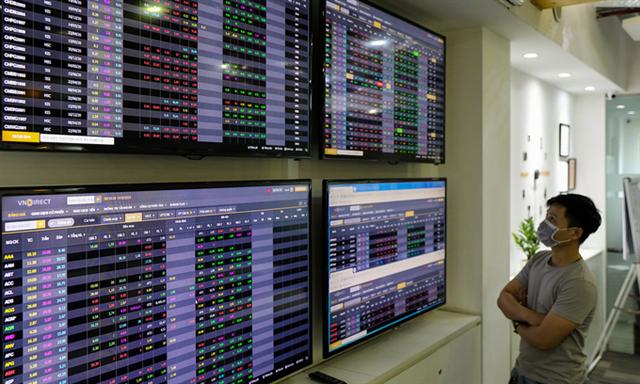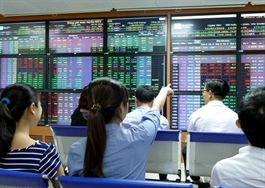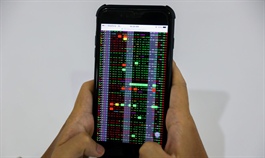Stock market 2020: a rollercoaster year that ends happily
Stock market 2020: a rollercoaster year that ends happily
Covid-19 sent Vietnam’s stock market tumbling to its lowest levels in years, only for it to rebound spectacularly as cash poured into the market.
An investor looks at stock prices on a screen at a brokerage in Ho Chi Minh City. Photo by VnExpress/Quynh Tran.
|
When the benchmark VN-index ended 2019 at 960.99 points, a rise of 7.67 percent in a sedate year with few fluctuations, no securities firms foresaw the rollercoaster ride that was awaiting them in 2020.
Steady macro-indicators had underpinned 2019, with GDP growing by 7.02 percent, inflation below the government’s 4 percent target, rising household consumption, and the U.S.-China trade war bringing foreign investment into Vietnam’s manufacturing sector.
"We expect this stability to continue in 2020," securities company VinaCapital had said in a forecast. Most securities firms in fact had rosy forecasts, saying the index would climb over 10 percent to end above 1,100.
Petri Deryng, portfolio manager at Finland-based PYN Elite Fund, had even predicted the VN-Index to rise to 1,800 points in the next two or three years.
All was well until January 30, when the Ho Chi Minh Stock Exchange (HoSE), Vietnam’s main bourse reopened after a week-long national holiday.
On that day the index plunged 3.22 percent, its biggest single day loss in over a year as investors raced to offload stocks, erasing all of January’s gains, after Vietnam confirmed its first two Covid-19 cases and began deploying emergency response teams and closing its borders with China to contain the pandemic.
The market continued to slide in February, losing almost 140 points as foreign investors pulled out of Vietnam and other Asian markets.
But bottom fishing by domestic investors stemmed the bleeding somewhat and brought some green amid the market’s sharp drops.
Crisis as Covid-19 situation escalates
The market saw its worst period in March, a month in which Vietnam’s Covid-19 numbers exploded from five to over 100.
The index dropped from 884 to 662, its lowest since early 2017, with several historic losing sessions as news of freshly discovered batches of Covid-19 cases came.
On some days the losses matched those that occurred during the 2008 global financial crisis, with the VN30, a basket of the market’s 30 largest stocks, sometimes seeing 10 of its components fall to their floor prices, an extremely rare occurrence for these blue chips.
"Investors were thrown into a state of panic over the fact that the disease seemed to be spiraling out of control in Vietnam’s key export markets such as the U.S. and EU," Tran Truong Manh Hieu, head of market strategy at KIS Vietnam Securities, said.
Foreign investors continued to sell off, and by March 24, after 30 consecutive sessions of net selling, pulled a total of VND8.5 trillion (US$366 million) out of the market, more than their total investment in 2019 ($315 million).
Hieu said they took the opportunity to transfer their funds from emerging markets like Vietnam to the U.S. and Europe, expecting big profits when the markets recovered as well as switching to safer asset classes such as gold.
Other Asian markets did little better in March, with India, Japan, South Korea, Indonesia, Thailand, and the Philippines having to apply circuit breakers amid coronavirus-triggered sell-offs.
By March end Vietnam had stopped all international flights and much of domestic transport, and mandated nationwide social distancing at the start of April.
Fresh investors spur recovery
But with the Covid-19 situation seemingly under control, with no new local transmissions since mid-April, by May-end the VN-Index became one of the best performing stock markets in the world.
Between April and May it clawed back over 31 percent of its losses to finish at 864 points, third only behind South Korea’s Kospi index and the U.S.’s S&P 500, which regained 39.2 percent and 36.1 percent, according to data from Bloomberg.
Trading volumes on HoSE rose sharply to VND6-7 trillion per session from the average of VND4-5 trillion in the previous three years and VND3-4 trillion at the height of the first Covid-19 wave.
Industry insiders speculated that the impact of the pandemic on jobs and incomes caused many people to look at stocks as a new asset class.
In the first six months of this year nearly 31 million people lost jobs or incomes as GDP growth fell to a 10-year low of 1.8 percent.
According to the Vietnam Securities Depository (VSD), in March, at the height of the Covid-19 crisis, securities companies opened 32,000 new domestic accounts, the highest monthly number since the market peaked in April 2018.
"The stock market is benefiting from surplus cash flows in the economy," Nguyen Huy Duc, chairman of SSI Securities Corporation, had said then.
He described it as "basically dead money" that people were unable to spend during the three weeks of social distancing in April against the coronavirus, and said other asset classes were unattractive.
Nguyen The Minh, vice president and head of retail research at brokerage Yuanta Vietnam, said after the government directed banks to lower loan interest rates to stimulate economic recovery, bank deposits became less attractive, and "cheap money" lent by banks inevitably trickled into equity markets.
With the real estate industry in decline since 2019, and Vietnam not having an official gold trading market, new investors are likely to continue pouring in cash to prop up the VN-Index even after 2021, he added.
VN-Index soars, liquidity at historic levels
Between July and August the VN-Index hovered around the 850-point mark as a second Covid-19 wave hit in late July after 99 days without local infections.
While it took the infection tally past 1,000 and caused the first several dozen deaths, swift lockdowns of localities with patients allowed economic activity to continue.
In fact, upticks in manufacturing and exports helped the GDP grow at 2.62 percent year-on-year in the third quarter, fueled by a 20 percent increase in exports of personal computers, according to the General Statistics Office, to meet the demands of a global workforce shifting to working from home.
Although foreign investors continued to sell off, the daily trading volume began to rise to VND5-6 trillion per session as the State Bank of Vietnam continued to lower interest rates and new investors continued to flock to the market, registering over 124,000 new trading accounts between July and August, according to the VSD.
The market began to stabilize in September, rising 3.6 percent to 914 points, a time when the government considered the outbreak to be under control and allowed commercial flights to several Asian destinations.
The trading surged to VND7-8 trillion a session, almost double that in the same period a year ago and on par with March 2018, when the VN-Index hit an all-time high of 1,204 points.
The VN-Index really picked up pace in the final quarter with several streaks of multiple days of gain and liquidity continuing to climb.
On November 26 it crossed the 1,000-point mark for the first time in two years, along with an explosion in volumes, with HoSE consistently clocking daily trades of VND11-14 trillion, the highest levels ever.
Based on reports by various securities companies, analysts said cash is flowing into a diverse range of sectors. Whereas recovery in the second quarter had depended on stocks in the banking, real estate and retail sectors, construction materials and oil and gas have also been attracting interest in recent months.
The final quarter also saw trading in other stocks consistently surpass that of VN30 stocks for the first time, with "investors seeking tickers that have not seen much growth in the near past for new profit-making opportunities when large caps are already at high price levels," BVSC said in a note.
Last Monday the VN-Index closed at 1,081.08 points, the highest level of the year and erasing all traces of the Covid-19 episode.
So what color will the 2021 market sport?
With the Covid-19 pandemic yet to abate in most countries, securities firms have been hesitant to make forecasts for next year.
But most agree that despite chugging past the 1,000-point mark there is room for the VN-Index to rise further, driven by the recovery of some industries like real estate and industrial zones and some major M&A deals scheduled for next year.
New cash from first-time retail investors, who are finding other assert classes less attractive than stocks, would also continue to play an important role, they said.
With the State Bank of Vietnam relentlessly lowering interest rates to stimulate a post-pandemic recovery and bond market regulations tightened, securities have become one of the most attractive investments.
VNDirect is the only securities company so far to make a specific forecast, saying it expects the VN-Index to rise to 1,180 points next year, the market’s price-earnings ratio to remain steady at 15.9 and corporate profits and dividend yields of listed stocks to rise.

























